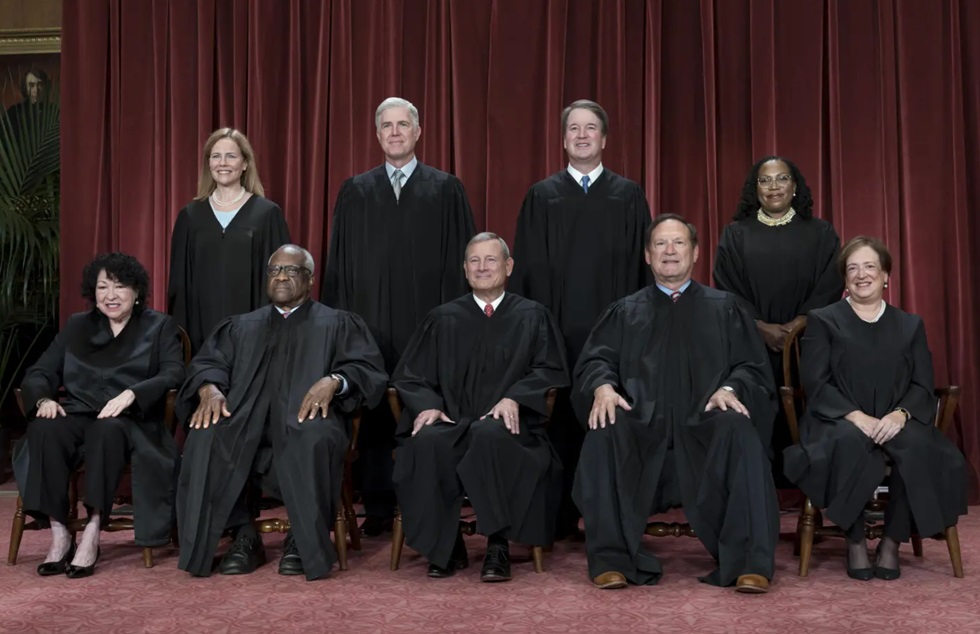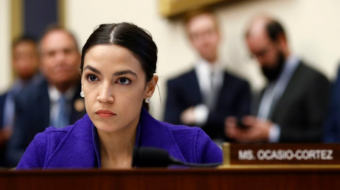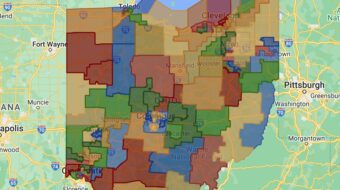
WASHINGTON—In a setback for Donald Trump’s foes—and for the U.S. Constitution, too—most U.S. Supreme Court justices appeared hostile to tossing him off presidential ballots. They focused on the idea that states cannot disqualify anyone from the presidential ballot but did not say who it is with that authority. They barely paid attention to Trump’s crimes including inciting, aiding and abetting the Jan. 6, 2021, U.S. Capitol insurrection, invasion and attempted coup d’etat.
Right wing Justice Allito expressed concern that removing Trump from the ballot would disenfranchise Colorado voters. He never mentioned the Trump crime of trying to disenfranchise 80 million voters across the country when he tried to overthrow the constitution.
On February 8, Trump challenged the Colorado Supreme Court’s decision to invoke the U.S. Constitution’s 14th Amendment and ban him from the ballot and from trying again to commit crimes while in office.. The amendment bars anyone who engaged in an insurrection against the government, after once taking the oath of office, “to preserve, protect and defend” the Constitution, from holding state and federal office again.
The justices, with possible exceptions of Sonia Sotomayor and Ketanji Brown Jackson, were skeptical of Colorado’s claim the amendment bans Trump from ballots. Only Justice Sotomayor bluntly said Trump engaged “in an insurrection” on January 6. Trump lawyer Jonathan Mitchell called it “a riot,” not an insurrection.
The case is important for workers, progressives and their allies. Bouncing Colorado’s Trump ban removes a roadblock to Trump from getting on all state ballots this fall, assuming he wins the GOP presidential nomination. He leads the race for the Republican nod by a wide margin by a wide margin.
A win in the High Court would let worker-hating anti-union Trump stay on primary ballots nationally. His four-year Oval Office record was filled with anti-worker and anti-union rulings and appointments—and an attempt to completely smash one small union, of immigration judges.
Trump’s reception from the justices doesn’t bring him out of the legal woods, or even away from the High Court. He’s expected to appeal a D.C. Circuit Court of Appeals ruling, two days before, saying he can’t claim presidential immunity from criminal prosecution, because he isn’t president any more.
Besides the Colorado case, serial misogynist Trump faces 91 criminal counts, most of them connected with the invasion and his attempts at stealing the 2020 election, in federal court in D.C. and in charges of racketeering and conspiracy—directed towards that same steal—in Georgia’s capital of Atlanta.
Trump has also vowed, now several times, to trash the Constitution if he wins power again. In his latest such vow, he promised to be a dictator only “on day one” if inaugurated Jan. 20, 2025. Nobody believes he’d stop then, and his lemming-like backers don’t want him—their god—to do so.
In 2022 he tweeted “A Massive Fraud of this type and magnitude”—his lie the election was stolen—”allows for the termination of all rules, regulations, and articles, even those found in the Constitution”
The Colorado case arose when six voters there, most of them Republicans and one a 91-year-old survivor of Adolf Hitler’s holocaust killing of six million European Jews, brought the state’s challenge, backed by government accountability groups.
Eleven other states, including New York, Maine and Illinois, are awaiting the High Court’s ruling in the Colorado case before going ahead with their potential constitutional challenges to his candidacy. Those cases are dead if the justices rule for Trump.
Trump’s lawyers’ main argument was that holding office under the government, as the amendment says, was not the same as being “an officer” of the government since the amendment lists offices it covers—and they don’t include the president. Most of the justices seem to have bought the absurd idea that Trump is not an officer of the government.
Trump lawyer Jonathan Mitchell told Justice Elena Kagan that Colorado—or any other state—can’t enforce the amendment “unless Congress gives its permission to do so” by legally establishing enforcement. It did in 1870, two years after the amendment was adopted, but repealed that law later.
“If we say” the amendment “can’t be enforced, what happens next?” Justice Ketanji Brown Jackson asked. “This case would be done, but it could come back with a vengeance” after the November general election and before the 2025 inauguration, Mitchell replied.
“We don’t know if Trump will be excused” by Congress “before he’s sworn in” if he wins this fall, Mitchell said. The amendment says 2/3rds votes in both houses of Congress can waive the constitutional ban on an insurrectionist becoming president.
Sotomayor challenges Trump idea
Justice Sotomayor told Mitchell that Trump “wants us to go two steps, maybe three, further and say that self-execution” of the amendment’s language disqualifying insurrectionists “doesn’t mean what it generally means.
“You want us to say now Congress must permit states or require states to stop insurrectionists from taking…office?” the justice asked. “Mm-hmm,” Mitchell replied.
By contrast, Justice Samuel Alito raised the possibility that if the justices rule for Colorado, different states could set different standards and disqualify different presidential candidates.
“It would be an unmanageable situation,” the justice said. Trumpite officials in several deep-red states have threatened, in revenge, to disqualify Democratic President Joe Biden, who also is running again.
And Justice Amy Coney Barrett, one of the three Trump-named justices, said Colorado “adds an additional qualification” for the presidency to those the Constitution lists.
Trump’s lawyers even argued he wasn’t an insurrectionist because he physically didn’t lead the 1,000-plus Trumpites whom he ordered to march down Pennsylvania Avenue to “Stop the steal” by stopping the mandated count of electoral votes on Jan. 6, 2021.
The lawyers’ claim ignores witnesses who told the House’s January 6 investigating committee that Trump unsuccessfully tried to wrestle his SUV’s steering wheel away from his Secret Service driver so that he could pilot it to the Capitol to lead the invaders.
The Trumpites trashed the Capitol, waved the Confederate flag within it, pursued frightened and fleeing lawmakers, family members, staffers and reporters—and injured 140 defending police officers.
Five others died in ensuing days. In a friend-of-the-court brief, Capitol Police officers sided with Colorado and declared Trump’s claim the Constitution’s First Amendment protected his January 6 speech ordering the invaders to march “wrong.” That Trump claim didn’t arise in the court’s session.
Even Justice Jackson admitted the final text of the 14th amendment, adopted in 1868 and designed to bar top Confederates from holding federal office, was a compromise. Some lawmakers wanted to list the president and the vice president among the “officers” subject to the ban. They lost, she noted.
“The history of the 14th Amendment actually provides the reason for why the presidency may not be included,” Justice Jackson said. Its drafters “were actually dealing with a different issue.
“The pressing concern” was “the possible infiltration and embedding of insurrectionists into the state government apparatus and the real risk former Confederates might return to power in the South… either in local offices” or in Congress.
“That seems to me very different than the worry that an insurrectionist will seize control of the entire national government through the presidency.”
Given that primaries and caucuses are under way, the justices are expected to decide the case quickly.
Ironically, at a press conference, Trump labeled January 6 “an insurrection,” after listening to the oral argument while at his Mar-a-Lago estate. Repeating another Republican lie, he blamed it on then-House Speaker Nancy Pelosi, D-Calif. Republicans still contending she didn’t call the police fast enough.
We hope you appreciated this article. At People’s World, we believe news and information should be free and accessible to all, but we need your help. Our journalism is free of corporate influence and paywalls because we are totally reader-supported. Only you, our readers and supporters, make this possible. If you enjoy reading People’s World and the stories we bring you, please support our work by donating or becoming a monthly sustainer today. Thank you!












Comments